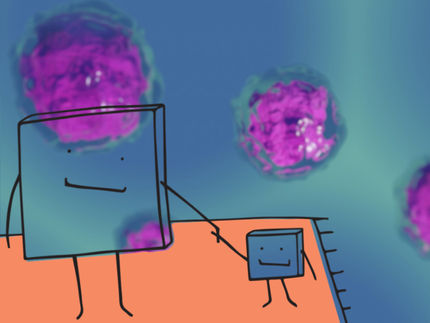Our versatile viral defenses
Researchers systematically track protein interactions in defense against viruses
The body’s defense strategies against viral infections are as diverse as the attacks themselves. A team from the Technical University of Munich (TUM) and the Max Planck Institute for Biochemistry has conducted a systematic investigation into a key feature of the antiviral innate immune response, namely into interferon-stimulated genes, or ISGs. The group succeeded in documenting the strategies deployed by ISGs to strengthen the body’s own defense against viruses for the first time.
Once inside the human body, viruses act like saboteurs. They use the molecular mechanisms of its cells to multiply and spread – sometimes with devastating results. To counteract this, the body has evolved an effective defense against viruses, which is part of our innate immune response. ISGs play a crucial role in this defense. “We know from studies conducted by fellow researchers that various ISGs can have an inhibiting impact on viral activity, but not exactly how they achieve this,” outlines Andreas Pichlmair, Professor of Viral Immunopathology at TUM’s Institute of Virology.
For their current study, Pichlmair and his team systematically investigated which proteins ISGs interact with. They activated a specific ISG in cell cultures and used mass spectrometry to determine the proteins interacting with the respective ISG. As a result of this intensive analysis, we now have information about 104 ISGs and 1401 proteins that bind with them. Around 90 percent of these interactions were previously undetected.
Insights into defense strategies
“Once we have identified the ISG interaction partners, we can go on to deduce how the body defends itself against viruses,” explains Pichlmair. “The initial findings already show just how varied this immune response is.” While some ISGs can modify viruses directly, others have an indirect effect. For instance, the interaction partners include cellular proteins used by the viruses for replication. Other ISGs interact with proteins essential to the cell’s energy balance. Another finding is that some proteins – such as the molecule LGALS3BP – interact with a large number of ISGs. Further experiments have shown that LGALS3BP plays a previously unrecognized key role in coordinating the antiviral immune response.
Pichlmair feels that these findings could also pave the way for new therapies: “If we know what our body is doing when it successfully combats a viral infection, we can find ways to set these defense mechanisms in motion for diseases that the body cannot deal with by itself.”
Databases: cornerstone of biomedicine
Andreas Pichlmair’s research project shows the importance of biomedical data repositories in basic and applied research. The current study, for instance, was based on data from various other studies investigating which proteins belong to the ISGs in the first place. Similarly, linking their findings with data from other scientists on viral protein interactions gave the researchers another important source of information.
TUM has consistently made important contributions to data-driven biomedical research in recent years – for instance by establishing the database ProteomicsDB, which offers free access to around 90 percent of the human proteome. More recently, Pichlmair and his team recorded the cellular proteins that the individual proteins of the Zika virus interact with, and were thus able to explain part of the pathogenesis of this virus.
Original publication
P. Hubel, C. Urban, V. Bergant, W. M. Schneider, B. Knauer, A. Stukalov, P. Scaturro, A. Mann, L. Brunotte, H. Hoffmann, J. W. Schoggins, M. Schwemmle, M. Mann, C. M. Rice and A. Pichlmair; "A protein interaction network of interferon stimulated genes extends the innate immune system landscape"; Nature Immunology; 2019
Other news from the department science
Most read news
More news from our other portals
See the theme worlds for related content
Topic World Mass Spectrometry
Mass spectrometry enables us to detect and identify molecules and reveal their structure. Whether in chemistry, biochemistry or forensics - mass spectrometry opens up unexpected insights into the composition of our world. Immerse yourself in the fascinating world of mass spectrometry!

Topic World Mass Spectrometry
Mass spectrometry enables us to detect and identify molecules and reveal their structure. Whether in chemistry, biochemistry or forensics - mass spectrometry opens up unexpected insights into the composition of our world. Immerse yourself in the fascinating world of mass spectrometry!






















































